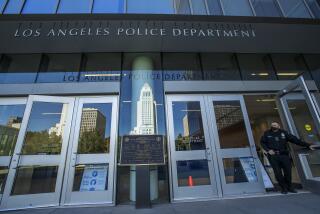Newton: A sheriff who does what he likes
It’s understandable that the Los Angeles County supervisors, confronted with a series of troubling reports of violence against inmates by sheriff’s deputies in the county jails, are appointing a special commission to investigate the department and recommend reforms. That was the approach Mayor Tom Bradley took in 1991 after the Rodney King beating rocked confidence in the Los Angeles Police Department and fueled public demands for change. The Christopher Commission ultimately became a model of modern police inquiry and helped restore confidence not only in the LAPD but in Los Angeles itself.
But this commission may have a hard time following in those footsteps. The Sheriff’s Department is an entirely different entity than the LAPD, and the recommendations of an outside inquiry would be unlikely to lead to change.
The principal issue that confronted the Christopher Commission, nicknamed for its chairman, Warren Christopher, was the inadequacy of civilian oversight of the LAPD. Nominally, the chief reported to the Police Commission, whose members were appointed by the mayor. But the police chief at the time, Daryl F. Gates, had contempt for Bradley and was protected from effective discipline by the city’s Civil Service rules.
Brilliantly led by its namesake, the Christopher Commission documented the extent and severity of the LAPD’s failings. Using the departments own records, the commission exposed shocking evidence of racism and systemic brutality in the department, and then made recommendations for how to strengthen civilian control to confront those issues. It created the Office of the Inspector General to give the Police Commission investigative powers; it recommended significant reforms in the LAPD’s disciplinary process; and, most memorably, it urged amending the City Charter to limit the chief of police to two five-year terms. Over Gates’ furious objections, voters approved the reforms and put the LAPD back on the path to professionalism, where it remains today.
At the Sheriff’s Department, however, the troubles are not with oversight in the same sense. Unlike the police chief, the sheriff is an elected official, and thus theoretically answers to the voters every four years. But this also means that unlike the police chief, he can’t be fired or disciplined. In effect, he has no boss but the voters, and that means an investigatory commission, no matter how effectively it does its job, will have little leverage.
The problem at the Sheriff’s Department hasn’t been a lack of civilian monitoring. Michael Gennaco heads the county’s Office of Independent Review, and though his operation is sometimes accused of being too close to the department, he performs functionally much the same job as the Police Commission’s inspector general. Moreover, the county separately contracts with Merrick Bobb, president of the Police Assessment Resource Center and a nationally respected expert on policing practices. Bobb’s quarterly reports are a model of civilian oversight, and regularly called attention to issues in the jail.
The trouble with the Sheriff’s Department, then, is not that it lacks civilian oversight or ideas for improvement, but rather that Sheriff Lee Baca is so insulated from normal channels of pressure that he simply does what he likes. Because he’s an elected official who has never faced serious opposition at the polls, all the civilian oversight in the world can’t force him to do what he doesn’t want to do. The LAPD had slipped the bonds of civilian control, but control could be reestablished; the Sheriff’s Department is insulated by politics.
Baca has shrugged off important suggestions in the past. He delayed installing cameras in the jails, for instance, and he’s been slow to restrict steel-toed boots and the use of flashlights as weapons to subdue inmates. Bobb and others have pressed Baca for change, and now the supervisors are doing the same.
It’s hard to see how a high-profile commission can be more successful. No matter what it recommends, Baca will remain a separately elected official, answerable to the supervisors for his budget but otherwise beyond their control. The state Constitution mandates that counties elect sheriffs; no commission can change that. And that makes Baca impervious to the kinds of pressures that can be applied to the police chief.
In explaining his support for the new commission, Supervisor Mark Ridley-Thomas, who served on the City Council during the King controversy, inadvertently put his finger on the dilemma that confronts this latest effort to improve the work of local law enforcement.
“To leave it exclusively under the domain of the sheriff,” he said of addressing problems in the jails, “is problematic.” And yet, it’s also unavoidable. That’s what may make the work of this new commission exceptionally difficult.
More to Read
Sign up for Essential California
The most important California stories and recommendations in your inbox every morning.
You may occasionally receive promotional content from the Los Angeles Times.











